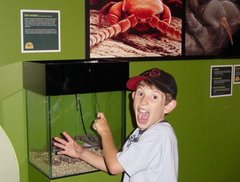Brett McLennan, ACMI, the twitch response:
- works actively and with agility – rapid feedback
- students and young people adapting to notion of fast response – they still have different learning styles, but are all processing small bits of information rapidly
- a sound byte generation – don't necessarily go deeper into content
- need to build programs that combine twitch response and the heavy lifting mode – to dive more deeply into what's there and apply that knowledge back to other areas
- dealing with new generation 'readers', they expect/demand:
- dynamic immersive experiences
- texts that enable them to be innovative and creative
- immediate feedback – including opportune for engagement and debate
- this challenge faced by all generations not only this one
- they network differently to what has gone before – Facebook, Bebo and MySpace are good examples of this
- dynamic immersive experiences
Angelina Russo, Social Media and Cultural Institutions, Engagement, Experience, Environment, Evaluation:
- today's museums are opening up more to audiences and recognising that museums are social experiences
- participation often on the museum's terms
- sites where people are already talking about you on blogs, wikis, podcasts, videos etc uploading their own content and are seen by the world
- peer networks, e.g. Amazon
- discussed the Engaging Social Media research project
- Distributed innovation and co-creation – paradigm shift for museums, but not necessarily a new idea or way of working
- Value networks
- Future?
- Connecting cultural experiences with boarder experience economies
- Creating new knowledge and networks which support co-creation
- Evaluating the experience – socially, culturally and economically
- Connecting cultural experiences with boarder experience economies
My paper – in the interests of climate change and reducing consumption I re-purposed our Museums and the Web 2008 paper so have a look at that...
Education programs sharing session
Benalla Art Gallery, DEECD and Hume Region – program that any teacher can facilitate back in the in school, inquiry-based and critical thinking skills, encourage them to think more deeply about artworks in creating their response drawing on a large knowledge base. Used Intel thinking tools, online graphic organiser sites. Sounded like a great program and reminded me how wonderfully creative, imaginative and clever young people are. Impressed with the way the project drew on materials across a range of museums and galleries and using a wiki as a way to organise and disseminate the information for teachers and students. Finished with a great quote form the subject of the artist Sir Edward 'Weary' Dunlop I have a conviction that it's only when you are put at full stretch that you can realise your full potential. How true!
SA Maritime Museum outreach program, Treasures of the Sea – an audio trail designed to promote key messages of the Maritime Museum and engage students with new technologies. I'm constantly inspired by people that are a section of one person and doing cool things for their audiences.
Queensland Museum Teachers-in-Residence program – seconded teachers programs are a good way forward. Talked about getting the QM website more interactive and compliant. QM education staff role to work with senior curators to understand what they're doing and then present information in engaging ways for students. Discussed three programs Mangrove Challenge; Refugee Stories and the Disease Detective. Liked the way that David explained how the staff all learned about this web stuff together – they weren't experts in technology but experts on pedagogy. Good one David!
Paul Howard Experiences at TATE Modern – development of an online community grid that tapped into an already existing community. Wanted also to extend audience reach beyond the physical site and develop new audiences. Talked about the benefits of doing stuff online through being able to re-visit the site and for curators t be able to adapt collections and material to suit the evolving needs of the group.
Ice e-mystery, TMAG – looking at ways to bring content to people who can't get to Antarctica, give interesting work and ideas to students that done normally have that access that is based on science and developing literacy skills. Also about promoting international collaboration and understanding. Connected the physical and online environments by encouraging them to visit TMAG exhibition. Another inspiring story of museum staff working creatively with little or no resource using free tools available on the web (in this case Wordpress) and seeking funding from different sources.



2 comments:
Pew Internet just released a new report on teenagers and gaming and Seb Chan has blogged about the implications of thereport fidnings for museums and interactive development here.
Also interested to recently read about Australian Chartered Public Accountant's use of video games as important corporate sector learning tools (see Jason Hill's 'In the trenches' in "In the Black". CPA Australia: October 2008)
Post a Comment